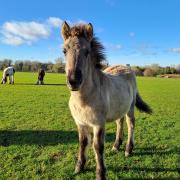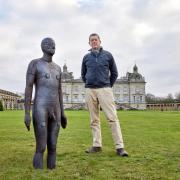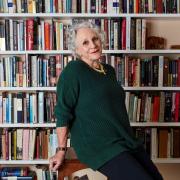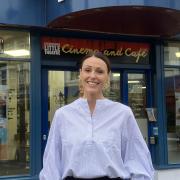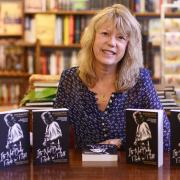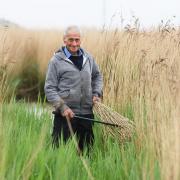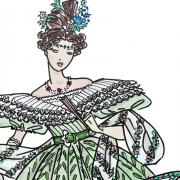In 1913, my grandfather was Rector of North Tuddenham. It was his practice to write an annual letter to his parishioners. That year he opened his letter with the comment that ‘politics has no place in a communication between parson and parishioners’, having said which he proceeded to express a series of views which most would judge political, or at least as representing the ‘establishment’ viewpoint. Having tilted, Quixote style, at the windmills of Fenians and Trade Unionists he saved his most savage assault for ‘politically-minded women indulging in unchecked outrages’ – the suffragettes. One might have thought that in the sleepy backwater of Norfolk village there was little awareness of the ‘outrages’ – by drawing attention to them he may inadvertently have promoted the suffragist cause!
While Norfolk may have been a backwater in many ways, it made a significant contribution to the cause of female suffrage, not least through the efforts of several local activists including the four covered in this article - Dorothy Jewson, Grace Marcon, Miriam Pratt, and Princess Sophia Duleep Singh.
Many of the leading suffragettes came from middle and upper middle class families and several of the Norfolk contingent shared this background – perhaps educated beyond the levels experienced by daughters of previous generations of the same families. But there were exceptions, and two suffragettes associated with Norwich particularly stand out.

The first was Miriam Pratt, the daughter of a domestic servant and a general labourer. Hers was not a Norfolk family, but two of her aunts had moved to Norwich. Somewhat ironically, as it was to turn out, each of them had married a Norwich policeman. Neither marriage was blessed with children and Miriam and her sister Harriet each came from Surrey to live with one of their childless aunts at about the turn of the century. Miriam was about eight when she came to live with her Aunt Harriet in 1898.
The movement to extend the vote to women had been growing for some years but, although the franchise had been extended to include far more males, the electorate still comprised less than a third of the adult population, and women had had to settle for a small extension to the franchise for local elections only - even that was limited to unmarried women. As time rolled on the suffragist movement, frustrated by the lack of genuine progress took on a much harder, sharper edge. More groups emerged, particularly the Women’s Social and Political Union, (WSPU) founded by Emmeline Pankhurst.
This new group was much more militant, and their choice of slogan, 'deeds, not words’ was more than a slogan, it was a maxim, fulfilled by the succession of ‘outrages’ to which my grandfather was later to refer. In the year he wrote, the suffragettes locally not only managed to burn down a large Newmarket Road mansion, but also stymied a planned opening of the new Buntings store in Norwich for a while by defacing the plate glass windows. It was also the year in which Emily Davidson died after throwing herself in front of a horse in the Derby to publicise the cause.
Meanwhile, Miriam Pratt had, by dint of a scholarship, managed to continue her education and, in time, became a teacher herself. She remained very committed to the suffragist movement. Militancy was on the increase, and merely handing out leaflets and selling suffragette pamphlets was not enough to satisfy her ambitions. She was arrested for arson, following the damage done to a property in Newmarket and to a university building in Cambridge. The evidence against Miriam was strong – a gold watch found near the latter building belonged to Miriam, and had been a present from her policeman uncle, who recognised it and felt duty bound to report his niece. While awaiting trial she was suspended by her employers. Defending herself in court she denied setting fire to the premises but admitted that she had been present when the fire was started. Sentenced to 18 months hard labour, she went on hunger strike and was released under the infamous ‘Cat and Mouse’ Act, and benefited from the general amnesty given when war broke out, and the militant WSPU agreed to discontinue their ‘acts of outrage’ for the duration of the conflict.

Also out of the normal run of suffragettes was a locally born lady, but one from the opposite end of the social spectrum – Princess Sophia Duleep Singh. She was born at Elveden, just into Suffolk. She was the daughter of Maharaja Duleep Singh, who had been placed on the Sikh throne by the British at the age of five, and unceremoniously removed from it by them at the age of 10. Brought to England he was initially a great favourite with Queen Victoria who set out to convert him into an English gentleman. The goodwill lasted long enough for Queen Victoria to become Sophia’s godmother, though it paled later as the family were stopped, at one point, from returning to India lest they became a focus for discontent with colonial rule. Sophia as a young lady dressed fashionably and lived an upper-class social life. On her father’s death in 1893 she became a wealthy woman, and also had the benefit of a ‘grace and favour’ apartment at Hampton Court through the generosity of the Queen.

But Sophia was far from being content to live a life of luxury as an English lady. Returning to India – possible since her father’s death – she became increasingly opposed to the British Raj, she was distressed at the poverty of the Indian population, of which she had become much more aware when she attended the famous Delhi Durbar in 1903 and was pretty much ignored by the establishment. Further visits in 1907 and 1909 reinforced her attitude and it was on her return from the last of these visits that she joined the militant WSPU. She supported the movement financially, and was practically involved as well, selling copies of the suffragette newspaper outside her house. Initially she kept a relatively low profile, though she was determined enough to refuse to pay her taxes (to the marked irritation of the then king, George V). Later she became more militant, even supporting the manufacture of bombs to create an anarchic state. Strangely, she was never arrested for suffragist activities, though it was known that she was under government observation for many years. Perhaps there was a concern that the arrest of such a public persona might turn her into a martyr for the cause.

Two other local suffragettes came from more typical backgrounds. Grace Marcon (sometimes known as Frieda Graham) was the daughter of a remarkable parish priest, Walter Marcon, Rector of Edgefield. He was the third generation of Marcons in that role, following his father and his grandfather. The Marcons were a well-connected and fairly wealthy family, and the patronage of that parish was in family hands. Marcon was a man of social conscience, he was responsible for greatly improving the housing stock in the village, opening its first school, and re-building the parish church. Maybe it was his social conscience which influenced Grace in her pursuit of a more equitable franchise. Having originally had a governess she was subsequently educated at a tiny school in Cromer where she was one of just six boarding pupils taught by a Miss Grace Pollard. Wherever her militancy was derived from, it was certainly evident in her behaviour. Having been bound over twice to keep the peace for her part in various scuffles and demonstrations in the company of the Pankhursts, she visited the National Gallery alone, hiding a hammer under her coat and proceeded to damage five paintings before she was stopped. Her father, a keen cyclist, had in his single days ridden to Venice and there developed a particular fondness for the work of Bellini; unfortunately the paintings Grace damaged included a work of his. This time in court she refused to plead, turning her back on proceedings. A ‘not guilty’ plea was inferred, but she was convicted and sentenced to six months imprisonment, but was released early, as had been Miriam Pratt after going on hunger strike.

The final suffragette in this article is Dorothy Jewson, to whose life and work I devoted a complete article in the March 2023 edition of Norfolk magazine, so I will discuss her only briefly. Again, she was from a privileged background, the daughter of a Jewson and a Jarrold. Educated at Norwich High School and Girton, Cambridge, she was a lifelong socialist, whose membership of the WSPU she combined with that of Keir Hardie’s Independent Labour Party. She fell out to some extent with the Pankhursts after their decision to suspend militant action during the Great War as a patriotic gesture. As a lifelong pacifist she could not accept such a limitation. She went on to become one of the first female Labour members of parliament, if only briefly. Perhaps her most significant success was while seeking to improve the plight of working women when employed by the National Federation of Women Workers, and in the relief of poverty as a Norwich councillor.
What happened to them all? Grace Marcon married, and emigrated to Canada, although she later returned to her native Norfolk. Princess Sophia, while visiting India several times, remained in England, dying in1948 and being cremated at her own request according to Sikh rites – her ashes being sent to India. Miriam Pratt married and moved to London, though she was later divorced. Dorothy Jewson married twice; sadly, she was widowed soon after each wedding. She continued in her unremitting service to the people of Norwich, even leaving a legacy on her death, in 1963, to the poor and needy of that city.
Each of them had made a significant contribution to the successful achievement of their objective and should be remembered with pride.




